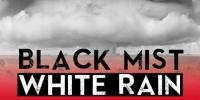The Tour Schedule: Monday April 4 in Adelaide; Tuesday April 5 in Melbourne; Wednesday April 6 in Sydney; Thursday April 7 in Brisbane. More detail at www.icanw.org/au/bmwr. Tour organiser Gem Romuld will arrange interviews with the speakers and/or representatives of the International Campaign to Abolish Nuclear Weapons: gem@icanw.org / 0421 955 066 / www.icanw.org.au
Australian and Marshall Islander nuclear
test survivors demand a ban on nuclear weapons
“Black Mist White Rain” Speaking Tour
4-7 April 2016
Four Indigenous women from South Australia and the Marshall Islands are touring
four Australian cities over four days to speak about how nuclear testing has impacted
their lives, and why a treaty banning nuclear weapons is urgently needed.
Sue Coleman-Haseldine, Kokatha-Mula, and Abacca Anjain-Maddison, Republic of
the Marshall Islands, spoke to more than 150 governments at the Third Conference
on the Humanitarian Impact of Nuclear Weapons in Vienna, December 2014. They
are joining forces again to bring their personal
stories to Adelaide, Melbourne, Sydney and Brisbane.
“The bombs have destroyed a large part of Australia and despite several attempts
it will never be safe or clean. There are many Aboriginal people who cannot go
back to their ancestral lands and their children and their children’s children
and so on will never know the special religious places it contains,” says Sue
Coleman-Haseldine.
Coleman-Haseldine and Anjain-Maddison will be joined by Rosemary and Karina Lester,
the daughters of Yankunytjatjara elder Yami Lester, who was blinded by the
Totem 1 nuclear test at Emu Field in 1953. Rosemary Lester on the nuclear testing
conducted in South Australia: “Many people died immediately, but others are
living with chronic health issues, cancers and disabilities. Not to mention
depression, the painful loss and trauma suffered mentally, the psychological
and social damage, and watching loved ones’ lives diminish. It has eroded our
culture and further marginalised our people.”
Britain conducted 12 major nuclear weapons tests in Australia between 1952 and
1963 at Monte Bello Islands, Emu Field and Maralinga. The United States
conducted 67 nuclear tests in the Marshall Islands between 1946 and 1958,
including the 15-megatonne “Castle Bravo” test at Bikini Atoll, which was 1,000
times more powerful than the bomb dropped on Hiroshima, and exposed thousands
of people to radioactive fallout.
“Marshallese people endured the loss of traditionally-held land and marine resources
without negotiation or compensation; (and) were exposed to fallout contamination
compromising the environmental health of individual and communities,” says Abacca
Anjain-Maddison.
In the wake of Three Conferences on the Humanitarian Impact of Nuclear Weapons,
127 nations have endorsed a Pledge to “fill the legal gap for the prohibition
and elimination of nuclear weapons”. A UN-endorsed working group to take
forward nuclear disarmament negotiations is meeting over three sessions during
2016, and is expected to lay the groundwork for negotiations to begin on a
nuclear weapons ban treaty.
“While the Republic of the Marshall Islands is holding nuclear weapons states
accountable in the International Court of Justice for their failure to disarm,
the Australian government continues to justify the utility of the nuclear
threat. The time is overdue for us to join the international majority in
banning nuclear weapons”, said Gem Romuld, of the International Campaign to
Abolish Nuclear Weapons- Australia.

